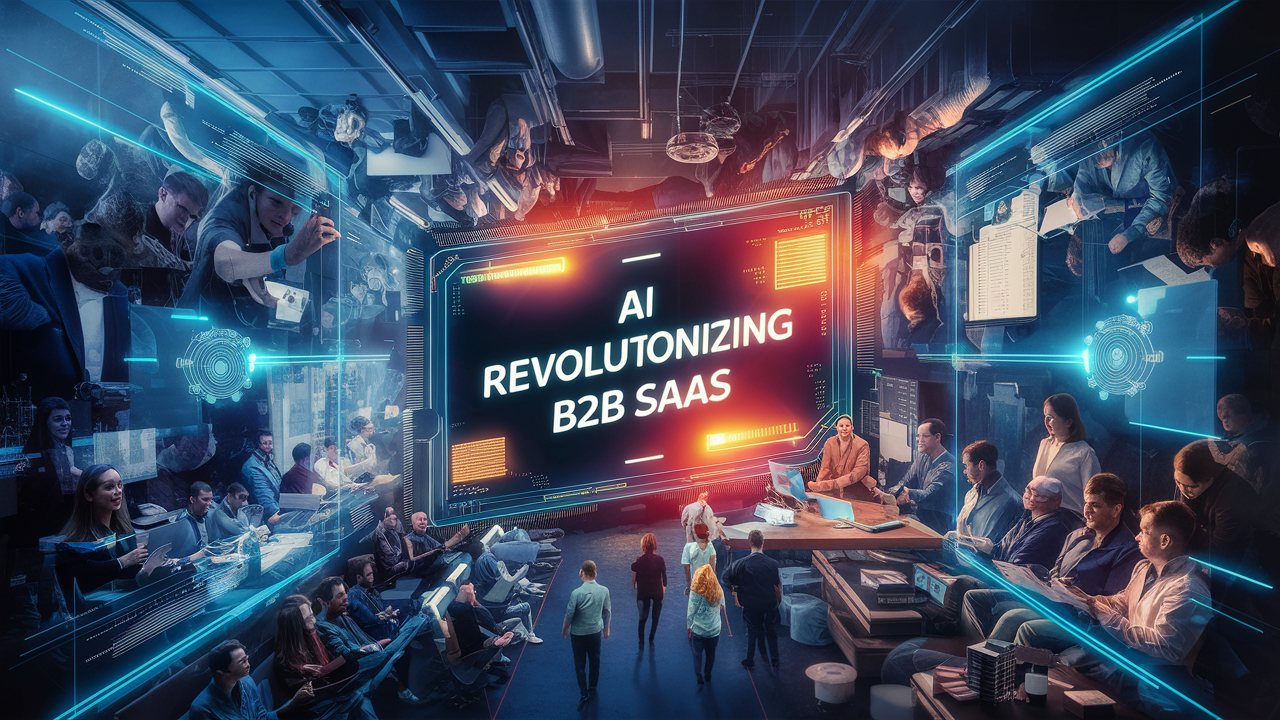How AI is Revolutionizing B2B SaaS: Driving Growth, Saving Time, and Boosting Your Bottom Line
AI is changing the game for B2B SaaS. Discover how it drives growth, boosts efficiency, and cuts costs. Get ahead of the curve!

In today's fiercely competitive B2B (business-to-business) SaaS (software-as-a-service) landscape, companies must find an edge to stand out, accelerate growth, and thrive. Artificial intelligence (AI) is rapidly emerging as a catalyst for transforming how B2B SaaS businesses operate, from customer acquisition to product development.
In this article, we'll explore how AI streamlines processes, empowers decision-making, and positions B2B SaaS providers for unparalleled success:
- Core AI applications in the B2B SaaS domain
- Real-world examples of AI in action
- How AI enhances efficiency, saving time and money
- The future of AI within B2B SaaS
How AI is Augmenting B2B SaaS Capabilities
Let's first examine the key areas where AI is leaving its mark:
- Intelligent Lead Generation: AI sifts through mountains of data to pinpoint the most promising leads, hyper-personalize outreach, and assist sales teams in prioritizing their efforts.
- Predictive Analytics: AI forecasts sales trends, anticipates customer churn, and identifies upselling opportunities, empowering data-driven decision-making.
- Customer Support Optimization: AI-powered chatbots provide swift 24/7 support, route complex requests, and analyze customer sentiment, enhancing the overall customer experience (CX).
- Product Development: AI analyzes vast datasets of user behavior to inform product roadmaps, suggests new features that will resonate, and helps companies create tailored solutions.
- Intelligent Automation: AI takes over repetitive, mundane tasks across sales, marketing, and support, freeing employees to focus on high-value activities.
Real-World Examples of AI-Powered B2B SaaS
Let's see how some innovative SaaS companies are already putting AI to work:
- Salesforce Einstein: Einstein is deeply embedded across the Salesforce suite. It predicts lead conversion likelihood, suggests the next best actions for sales reps, and automates routine admin tasks.
- Drift: Conversational AI chatbots on the Drift platform engage website visitors, qualify leads, book meetings, and offer an always-on support channel.
- Gong: Gong analyzes recorded sales calls, offering insights into conversation patterns, identifying objections, and helping sales teams refine their pitches.
- HubSpot: HubSpot utilizes AI for lead scoring, content personalization, and automated email campaigns tailored to individual prospects.
AI's Transformative Impact: Saving Time, Boosting Efficiency, and Driving Growth
How does implementing AI solutions translate into tangible benefits for B2B SaaS companies?
- Time Savings & Increased Productivity: By relegating repetitive or time-consuming tasks to AI algorithms, employees have more bandwidth to focus on strategic initiatives, customer relationships, and creative problem-solving.
- Reduced Operational Costs: AI-powered automation can streamline processes, reducing the need for manual labor, leading to significant cost savings in areas like customer support.
- Enhanced Sales Effectiveness: AI assists sales teams in accurately pinpointing high-potential leads, provides data-backed insights during conversations, and shortens the overall sales cycle.
- Improved Customer Satisfaction: Proactive, responsive, AI-powered support systems lead to happier customers who feel valued and understood, increasing customer lifetime value (CLV).
- Data-Driven Innovation: AI's ability to unlock hidden patterns and trends in massive datasets enables SaaS companies to create products and services that truly align with evolving customer needs.
The Future: AI as an Indispensable B2B SaaS Tool
The integration of AI within B2B SaaS is still in its relatively early stages, but its potential is undeniable. Here's what the future may hold:
- Hyper-Personalization at Scale: Expect AI to tailor every interaction - from marketing messages to the in-app experience, addressing individual customers' unique pain points.
- AI-Driven Pricing Optimization: Real-time data analysis will allow B2B SaaS companies to implement dynamic pricing models that maximize revenue while remaining competitive.
- Proactive Problem Solving: AI could predict potential support issues before they occur, preventing problems and enhancing the customer experience.
- Predictive Product Roadmaps: AI-powered product development will become increasingly sophisticated, resulting in highly sought-after features and solutions.
Getting Started with AI for your B2B SaaS
- Start Small: Focus on a specific use case (e.g., chatbots for support) or a high-impact area where AI can provide immediate value.
- Clean Data: Ensure you're collecting clean, relevant data, as it's the fuel that powers accurate AI insights.
- Iterative Approach: Regularly evaluate AI performance, adjust models, and experiment with new applications over time.
- Ethical Considerations: Be transparent about AI usage, avoid algorithm bias, and prioritize data privacy.
- Human-AI Collaboration: View AI as a powerful tool, not replacing human ingenuity and expertise.
Let's delve deeper into embracing the AI revolution for B2B SaaS success!
Keys to Successful AI Implementation
Adopting AI isn't just about the technology itself. Here are some strategic factors to ensure a seamless and productive experience:
- Clear Goals: Avoid implementing AI for the sake of it. Define precise business objectives that AI will help you achieve. Are you aiming to increase lead conversion, reduce churn, or improve product stickiness?
- Measurable KPIs: How will you gauge AI's success? Identify key performance indicators (KPIs) to track progress and prove return on investment (ROI).
- Upskilling Your Team: Invest in training your employees to understand and effectively leverage AI tools. Explainable AI can help them build trust in the algorithms.
- Change Management: Implementing new technologies can be disruptive. Prepare your team for change and actively address concerns early on.
- Partnering with AI Experts: For complex projects, consider collaborating with an external AI consultancy to ensure strategic alignment and the right technical expertise.
Overcoming Challenges
While AI promises great rewards, there are potential hurdles to consider:
- Cost: AI solutions can be expensive to develop or integrate. Start with a well-defined pilot project to demonstrate value before a larger commitment.
- Data Quality: AI is only as good as the data you feed. Prioritize data collection and cleaning processes for accurate and meaningful results.
- The Black Box Problem: Some complex AI models lack transparency. Focus on explainable AI where possible, especially for critical decision-making.
- Integration: Siloed AI solutions are ineffective. Ensure any new tools integrate seamlessly with your existing tech stack and that data flows smoothly.
Staying Ahead: Emerging Trends in B2B SaaS AI
Let's take a peek into the exciting trends shaping the future of AI in this field:
- Natural Language Processing (NLP) Advancements: Expect AI to become even better at understanding conversational language, improving chatbots, sentiment analysis, and content generation.
- AI for Sales Enablement: AI will further empower sales teams with insights into customer behavior, competitor analysis, and even the generation of tailored sales proposals.
- AI-Powered Cybersecurity: As threats evolve, AI will be crucial in advanced threat detection and automated incident response within B2B SaaS environments.
- Generative AI in SaaS: AI may co-create marketing content, generate code snippets for low-code development, and tailor in-app user experiences.
Conclusion
AI is poised to become the defining technology for B2B SaaS companies seeking sustainable growth. By embracing it strategically, SaaS businesses can streamline operations, unlock data-driven insights, and deliver unparalleled customer value. AI is not the sole answer to every challenge, but it will increasingly give savvy SaaS companies a significant edge.
The rapid evolution of AI ensures that this landscape will continue to shift and present new opportunities. Staying informed and adapting to the pace of change will be paramount for continued B2B SaaS success.

